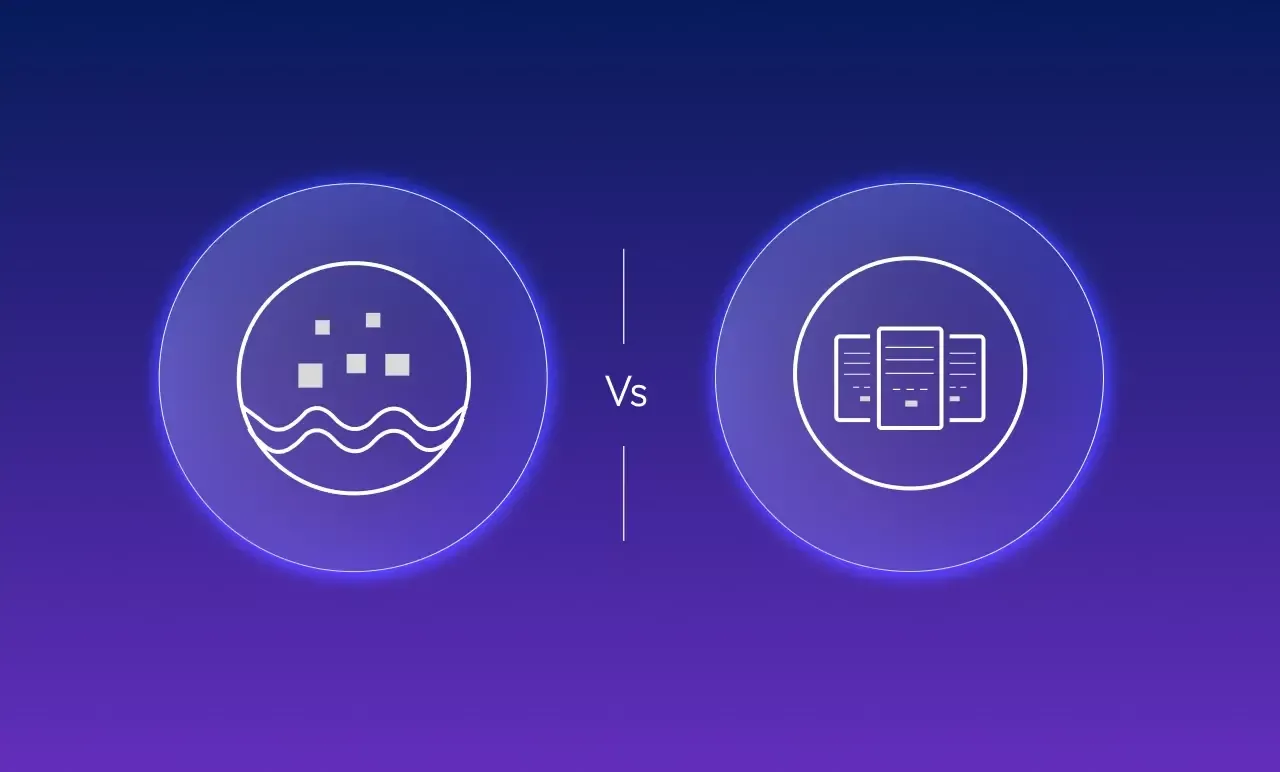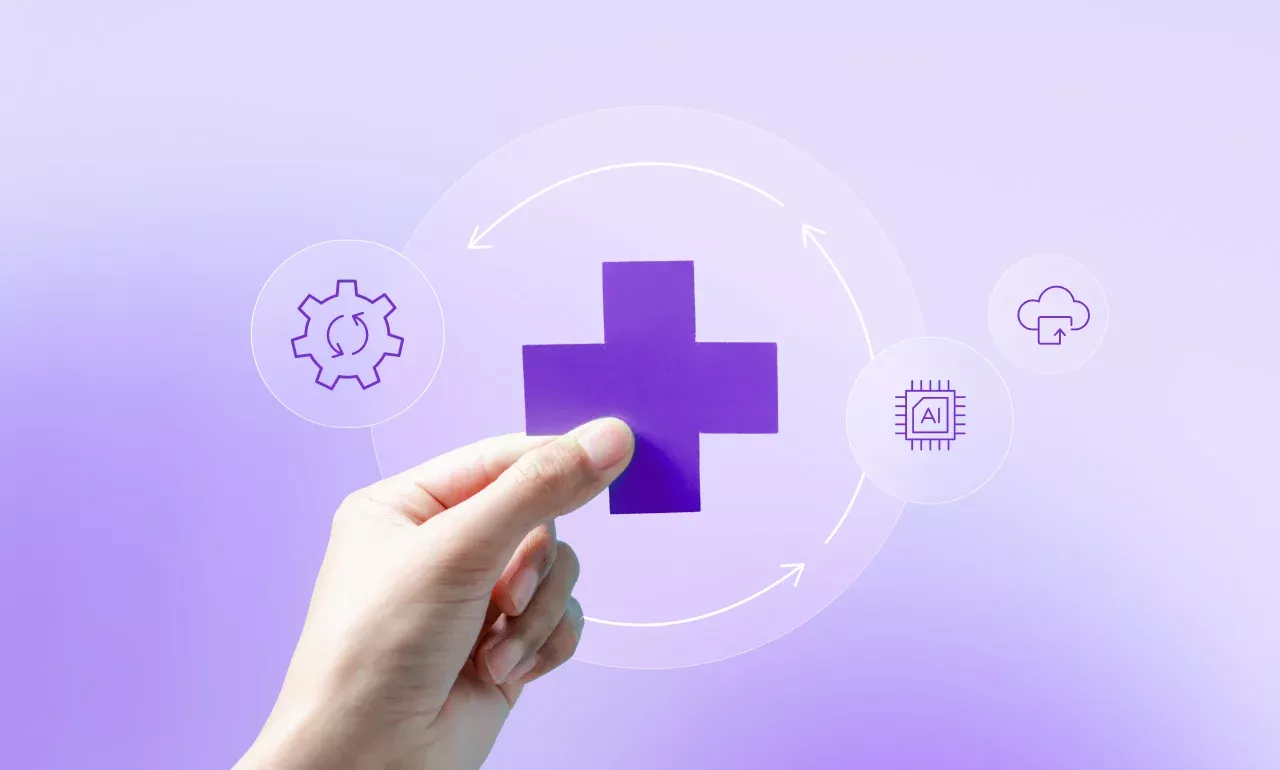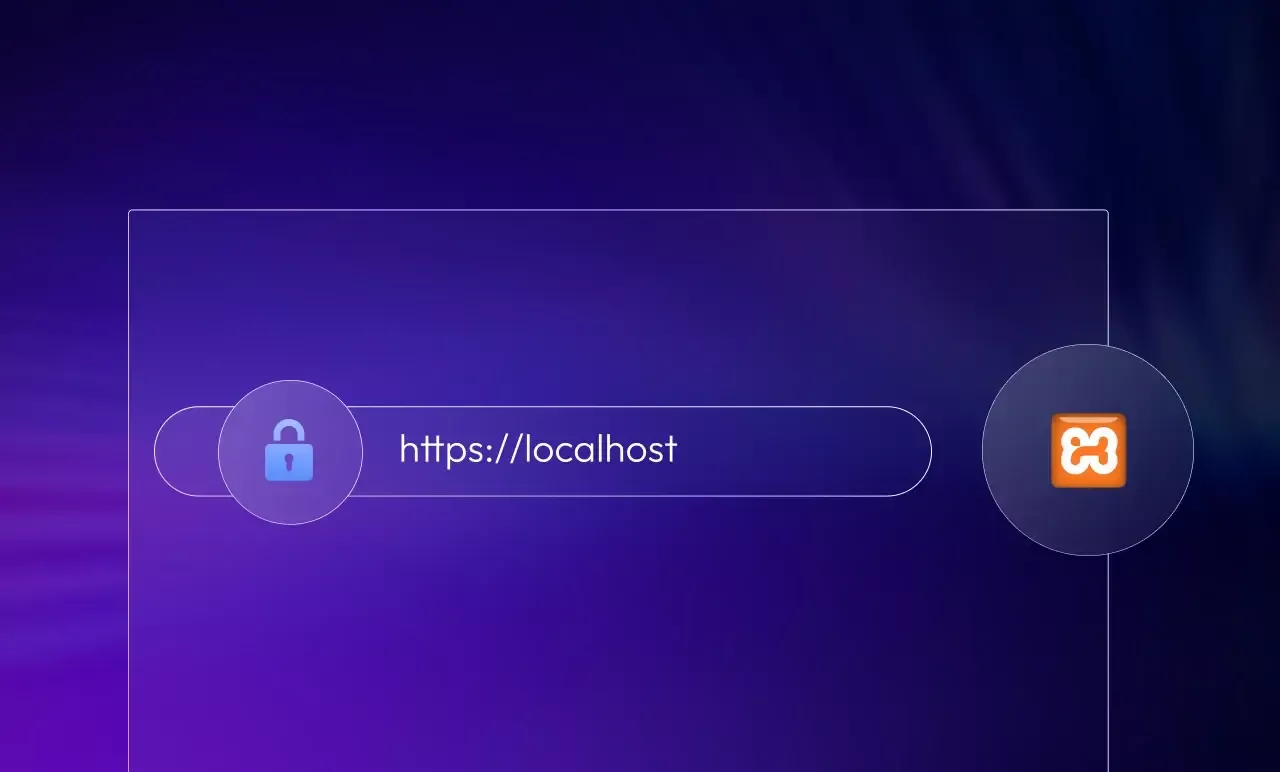Data Storage Decoded: Data Warehouse vs Data Lake Explained
Managed IT Services for Healthcare: Leveraging Technology for Enhanced Patient Care
Managed IT services for healthcare are becoming essential as medical care providers grapple with increasingly complex digital systems.
As technology infiltrates every stratum of patient care, managing vast IT infrastructures is becoming a growing challenge, both in terms of cost and staffing. While workforce shortages can impede strategic development, unplanned system downtime can lead to significant financial losses for hospitals.
Relying on internal teams to juggle intricate, mission-critical systems can often lead to individual burnout and inefficiencies on an organizational level.
Partnering with specialized service providers, instead, hospitals can streamline digital transformation, reduce operational burdens, and focus on delivering exceptional patient care.
Why Outsource IT Solutions for Healthcare?
Among the top industries dealing with sensitive client information, healthcare probably tops the list. That makes it all the more reason for healthcare IT managed services to be indispensable.
Although many healthcare professionals hesitate to hand over IT responsibilities to a third-party, Managed Service Providers (MSPs) bring specialized expertise, reducing the risk of data breaches and improving efficiency.
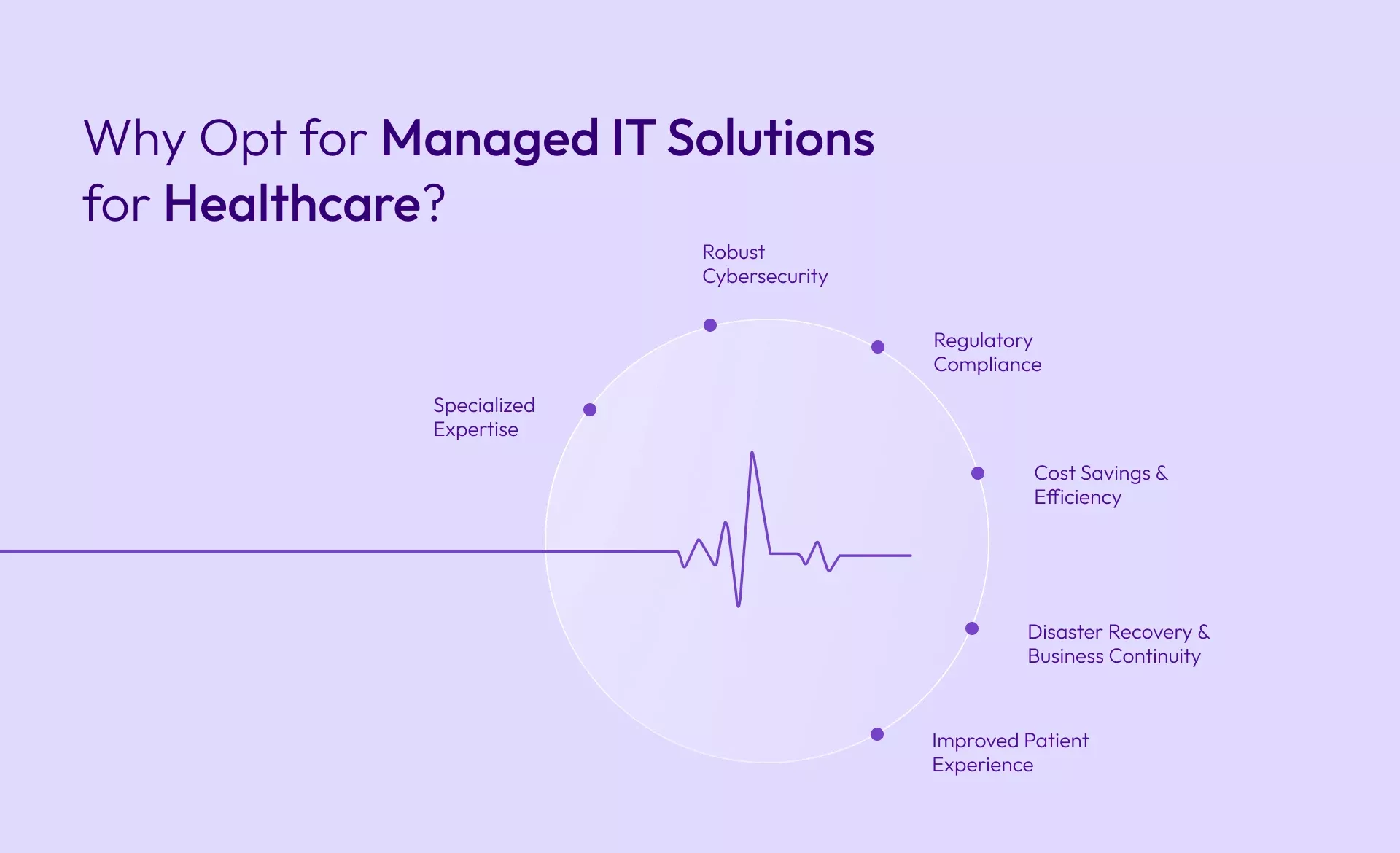
The Role of Managed IT Services in Healthcare
So, what are managed services in healthcare?
As the healthcare industry increasingly relies on digital tools like EHRs and telemedicine, managing complex IT systems becomes a challenge.
Managed IT services (MITS) empower healthcare providers to focus on patient care while ensuring that technology runs smoothly and securely, with:
- Outsourced IT Solutions: These services encompass outsourced IT support, including network monitoring, system updates, cybersecurity, data backup, and cloud services.
- Comprehensive Coverage: They manage both clinical and administrative IT systems, ensuring a robust and secure digital infrastructure.
Benefits of Managed IT Services for Healthcare
By outsourcing IT management, healthcare organizations unlock a range of benefits that secure sensitive data, streamline operations, and elevate patient care.
- Specialized Expertise: Rapid advancements in AI and analytics, and automation make IT maintenance challenging. MSPs deliver targeted IT support, handling everything from routine maintenance to 24/7 system monitoring, freeing up internal teams.
- Robust Cybersecurity: With medical data being a prime target for cyberattacks, MSPs deploy encryption, network monitoring, endpoint security, and real-time threat detection. These minimize risks and strengthen protection.
- Regulatory Compliance: Navigating complex regulations like HIPAA and GDPR can be overwhelming. MSPs conduct audits, vulnerability assessments, and compliance checks to ensure adherence, reducing risks and easing the burden on internal teams.
- Cost Savings & Efficiency: Maintaining an in-house IT team is expensive and resource-intensive. MSPs offer round-the-clock support, optimize resource allocation, and reduce downtime, making operations more efficient and cost-effective.
- Disaster Recovery & Business Continuity: Unexpected disruptions, from cyberattacks to system failures, can impact patient care. MSPs implement robust recovery strategies to restore critical systems quickly and ensure uninterrupted service.
- Improved Patient Experience: Reliable IT systems enable seamless access to electronic health records, minimizing delays and allowing providers to focus on delivering high-quality patient care.
Key Services Covered Under Managed IT in Healthcare
Here is a comprehensive list of managed IT services for healthcare, tailored to provide the expertise and proactive support needed to maintain seamless, secure, and efficient digital medical environments.
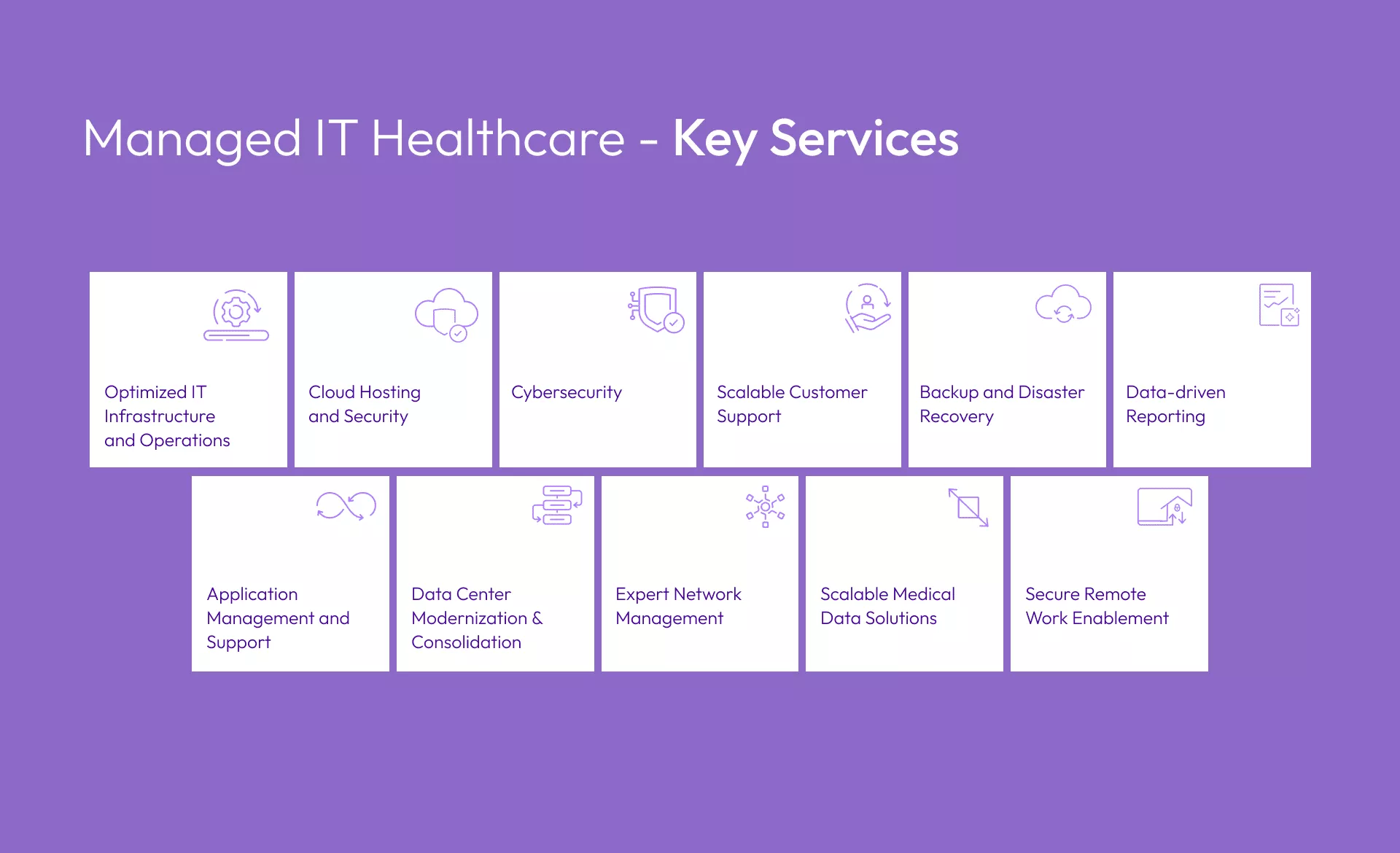
Optimized IT Infrastructure and Operations
A robust IT environment is vital for modern healthcare. Managed IT service providers (MSPs) streamline both infrastructure and operations by ensuring:
- Seamless IT Management: Overseeing servers, networks, storage, and cloud environments to maintain a high-performing and reliable system.
- Continuous Monitoring & Support: Providing 24/7 tracking of network health, application performance, and bandwidth usage while handling incident resolution, problem management, and routine maintenance.
- Enhanced Security & Compliance: Implementing regulatory safeguards, monitoring for risks, and optimizing connectivity to maintain secure, efficient, and compliant healthcare IT systems.
Cloud Hosting and Security
Managed IT services for healthcare offer an integrated approach that combines advanced cybersecurity with managed cloud hosting. It can offer healthcare organizations a comprehensive, multi-layered solution via:
- Multi-Layered Security Protection: Proactive monitoring and continuous security assessments detect and neutralize threats before they disrupt operations. This safeguards the entire IT ecosystem—from edge devices to cloud infrastructure.
- Scalable & Secure Cloud Solutions: Supports public, private, or hybrid cloud models with seamless migration, configuration, and ongoing management to optimize performance and security.
- Smooth Cloud Transition: Follows a phased approach to building, migrating, and managing cloud infrastructure, ensuring minimal disruptions and maximum efficiency.
Cybersecurity
Data breaches in healthcare organizations have doubled from 2018 to 2022, with a 42% spike during the COVID-19 pandemic. In this high-stakes environment, protecting patient information demands a long-term strategic approach that MSPs can deliver.
Here’s how:
- Proactive Defense: Shift from reactive responses to continuous threat monitoring and prevention. MSPs leverage advanced intelligence to detect and mitigate vulnerabilities before they escalate, strengthening cybersecurity.
- Comprehensive Security Services: Access scalable security solutions like identity management, risk analysis, and 24/7 incident response, ensuring multi-layered protection and compliance.
- Operational Efficiency & Cost Savings: Minimize downtime and reduce costs with expert-managed security, allowing internal teams to focus on strategic initiatives and patient care.
Scalable Customer Support
Businesses can leverage healthcare IT managed services in customer service to ensure faster issue resolution, reduced downtime, and improved workforce productivity with
- 24/7 Help Desk Availability: Round-the-clock, US-based IT support swiftly resolves routine issues like password resets, minimizing downtime, and ensuring seamless operations.
- Enhanced Technical Assistance: Expert support for complex IT issues, regular updates, and proactive troubleshooting reduces inefficiencies, resolving up to 70% of tickets without escalation.
- Cost-Effective IT Management: Fixed costs enhance budget stability, while reduced technical disruptions improve productivity, employee satisfaction, and retention.
- Proactive IT Strategy & System Enhancements: Built-in recovery processes, ongoing system improvements, and streamlined IT operations strengthen long-term business resilience.
Backup and Disaster Recovery
MSPs deploy automation in healthcare to integrate full data backup with effective disaster recovery methods to ensure data remains secure and recoverable. This approach helps maintain continuous business operations, even during major technical disruptions.
- Comprehensive Data Protection: Secure, automated backups prevent data loss and protect against corruption or breaches. Advanced encryption and redundancy measures ensure sensitive information remains intact and recoverable.
- Rapid Recovery & Minimal Downtime: Efficient disaster recovery processes enable quick restoration of data and systems, reducing downtime and minimizing operational disruptions. Automated failover mechanisms ensure seamless business operations.
- Enhanced Business Continuity: Proactive safeguards maintain stability during IT failures, cyber incidents, or natural disasters. Continuous monitoring and contingency planning help organizations recover swiftly while minimizing financial and reputational risks.
Data-driven Reporting
Efficient reporting is critical for informed decision-making and operational efficiency. Managed IT services for healthcare streamline the entire reporting process, from data aggregation to visualization, ensuring organizations receive accurate and actionable insights.
- Customized Reporting Solutions: Organizations receive tailored reports that align with their operational needs and industry standards, ensuring they get the right insights at the right time.
- End-to-End Data Management: Data from multiple sources is aggregated, processed, and structured with accuracy, eliminating inconsistencies and redundancies for more reliable reporting.
- Advanced Data Visualization: Interactive dashboards and real-time analytics provide clear, easily interpretable insights, enabling businesses to track performance and make informed strategic decisions.
Seamless Application Management and Support
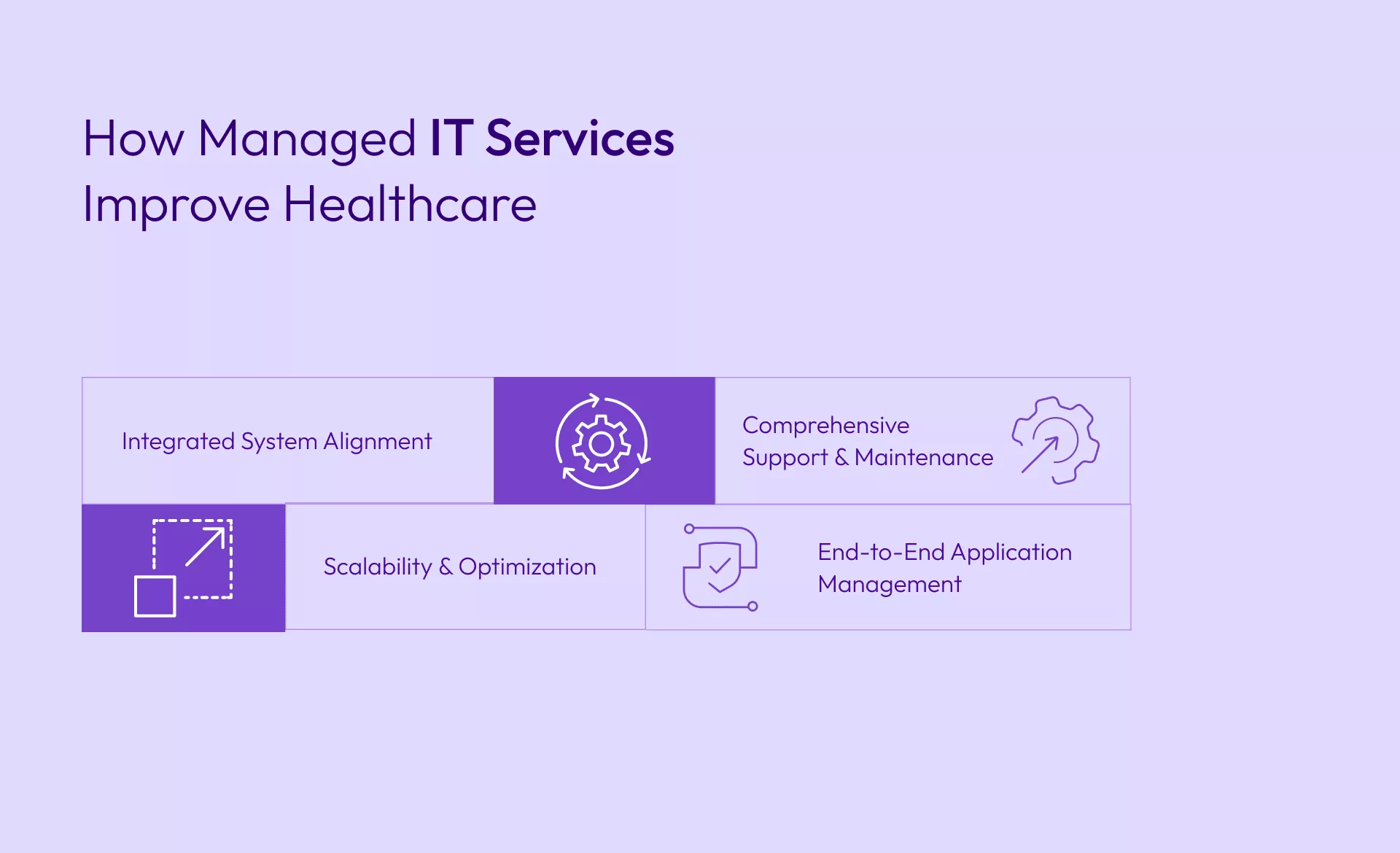
Effectively managing healthcare applications demands expertise and continuous oversight. A healthcare-focused MSP ensures seamless integration, optimization, and support, improving efficiency and patient care.
- Integrated System Alignment: Applications are strategically aligned with electronic health record (EHR) platforms, ensuring consistent change control and proactive incident management.
- Comprehensive Support & Maintenance: From service desk assistance to break/fix support and routine system updates, an MSP handles everything. That comprises the full spectrum of application maintenance, reducing downtime, and improving system reliability.
- Scalability & Optimization: Expert consulting and program management enable healthcare organizations to deploy, scale, and optimize applications across departments, ensuring continuous improvement and efficiency.
- End-to-End Application Management: Ancillary applications across the entire healthcare ecosystem are efficiently managed for a more connected and streamlined operation. These include patient access, care navigation, radiology, diagnostics, and financial services.
By outsourcing application management, healthcare organizations can alleviate IT burdens, enhance system performance, and focus on delivering high-quality patient care.
Strategic Data Center Modernization & Consolidation
Upgrading technology infrastructure is the foundation for building a more efficient and scalable IT environment. A modernized data center simplifies operations, enhances security, and ensures seamless scalability, allowing healthcare organizations to stay ahead of evolving demands.
- Optimized Infrastructure & Scalability: Leveraging Infrastructure as a Service (IaaS) and technologies like HPE GreenLake enables organizations to scale seamlessly. Simultaneously, they can adopt modern data center solutions that enhance performance and efficiency.
- Enhanced Storage & Disaster Recovery: Modernizing data storage, backup, and disaster recovery processes ensures business continuity by minimizing downtime and protecting critical healthcare data from potential system failures.
- Advanced Security & Data Protection: The adoption of Backup as a Service and enterprise cloud backup solutions safeguards sensitive data. This provides restorable backups in case of ransomware attacks or other security threats.
Expert Network Management
Increasing data volumes and security threats demand continuous oversight and expertise to manage complex networks. A Managed Service Provider (MSP) delivers this expertise to enhance performance, security, and innovation across healthcare organizations.
- Proactive Monitoring & Management: Continuous monitoring detects and resolves issues before they disrupt operations, ensuring seamless data flow and minimal downtime.
- Security & Technology Integration: Utilizing generative AI in healthcare, MSPs drive threat detection, encryption, and automated routing to enhance security. This optimizes network speed and reliability.
- Innovative Solutions & Insights: Regular assessments help implement advanced solutions like Virtual Desktop Infrastructure (VDI) for secure remote access and SD-WAN for cost-efficient, high-performance connectivity.
- Future-Ready Infrastructure: Strategic guidance enables healthcare providers to scale operations, supporting telemedicine, medical imaging, and other growing digital demands.
Secure & Scalable Medical Data Solutions
Managed IT services for healthcare facilitate a strategic approach to medical data management with:
- Comprehensive Data Classification & Storage: Identifying where data is stored and classifying Protected Health Information (PHI) and Personally Identifiable Information (PII) ensures proper data governance and security.
- Optimized Data Accessibility & Archiving: Differentiating between archived and actively accessible data streamlines operations, reduces storage costs, and enhances retrieval efficiency.
- Robust Backup & Security Measures: Managed IT services provide proactive solutions for data backups, ransomware mitigation, and testing windows, ensuring business continuity and regulatory compliance.
Secure Remote Work Enablement
To keep pace with the shift toward telehealth and hybrid work, healthcare organizations need a robust, secure IT infrastructure. Healthcare IT managed services equip them with advanced solutions to enable seamless remote access, ensuring efficiency, compliance, and data security.
- Secure & Controlled Access: Virtual Desktop Infrastructure (VDI) and Desktop-as-a-Service (DaaS) allow healthcare organizations to maintain control over sensitive systems while ensuring data security, even when accessed remotely.
- Enhanced Telehealth & Hybrid Workforce Support: Optimizing network design and security enhances telehealth experiences and enables smooth remote operations for clinicians and administrative teams.
- Future-Ready Digital Infrastructure: Organizations that rapidly deployed remote work solutions during the pandemic can now refine their approach, ensuring long-term efficiency, security, and compliance.
Moving ahead
A well-structured strategy to adopt managed IT services for healthcare empowers organizations to stay ahead in an increasingly digital world.
By addressing concerns around outsourcing, aligning expectations, and leveraging expert-driven solutions, providers can enhance efficiency, security, and patient care.
From minimizing downtime and mitigating cyber threats to streamlining workflows and adopting cutting-edge innovations, an MSP partnership creates a resilient, future-ready healthcare ecosystem.
Email us or Talk to us at +91-98367-81929 or Simply Contact Us through the website.
Let's Connect


